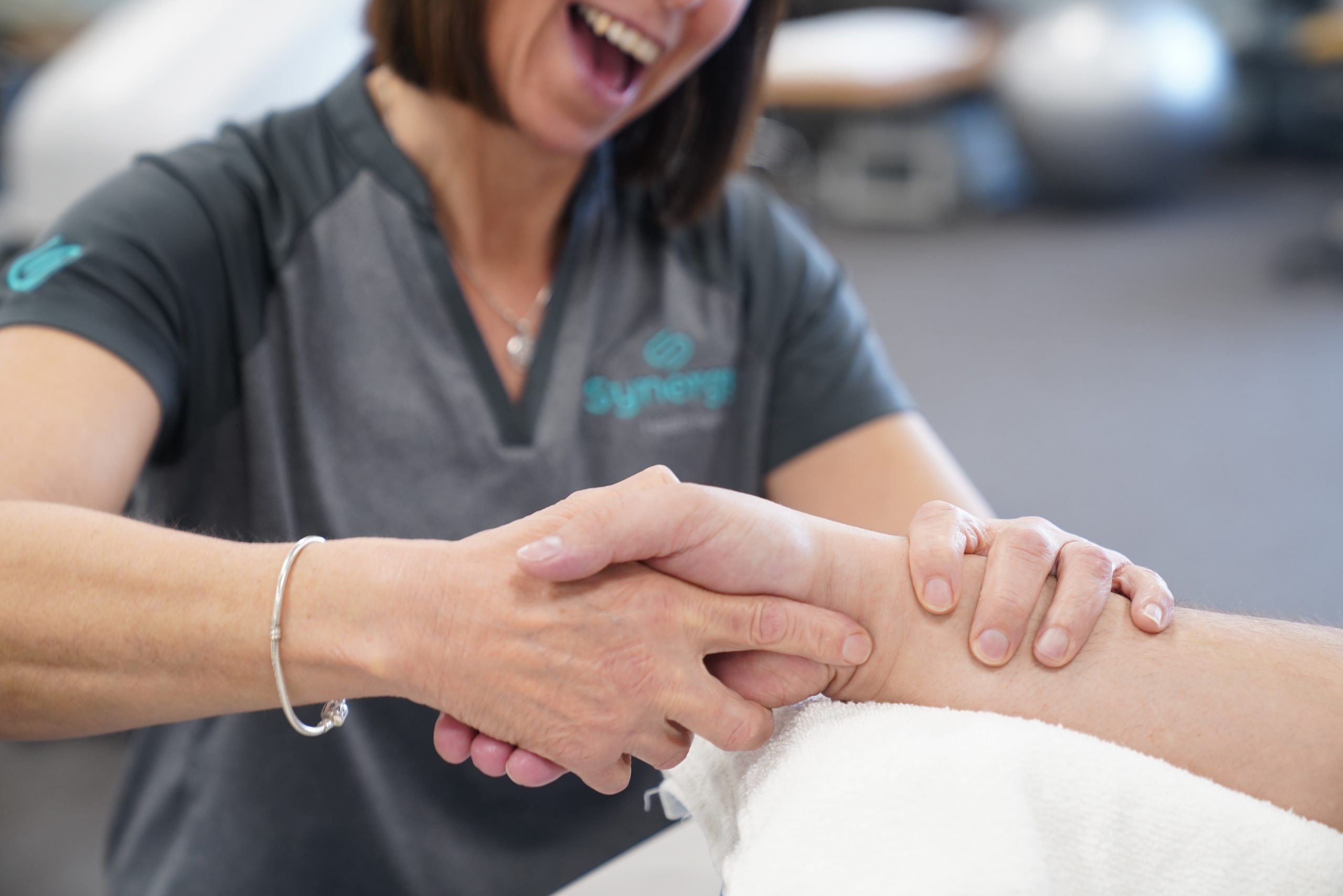Home | Specialties | Physical Therapy
Physical Therapy
Synergy Health Partners Physical Therapy offers experienced physical therapists and advanced orthopedic care in a compassionate and safe environment.

Where Synergy Meets Better Health
We offer one-on-one personalized care using evidence-based approaches that include painless hands-on strategies whenever possible to restore function and relief pain. Our goal is to collaborate with the patient, their family and health care providers to achieve their health goals. After an injury, your priority is getting back to your life as quickly as possible. We understand choosing the right care is an important first step in your road to recovery. Our mission is to provide compassionate care with high quality outcomes. With your dedication and our expertise, we will work together to get you back to the healthy and active lifestyle you deserve. In some cases, other treatments and therapies may be used in conjunction with physical therapy as part of a comprehensive rehabilitation or pain management plan, including:
• Occupational therapy
• Cognitive Functional Therapy
• Chiropractic care
• Lifestyle modifications
• Assistive devices or orthotic support
What is Physical Therapy?
Physical therapy is a vital component of our integrated musculoskeletal care approach, playing a crucial role in helping patients recover from injuries, manage chronic conditions, and improve overall mobility and function. Through a comprehensive evaluation, our therapists identify the underlying causes of your condition and create a tailored program to address your specific needs. Whether you’re recovering from surgery, dealing with a musculoskeletal injury, or managing a chronic condition like arthritis or fibromyalgia, physical therapy can help you regain your independence, improve your quality of life, and prevent further complications.

Achieving Your Rehabilitation Goals
Our licensed physical therapists work hand-in-hand with your doctor and have extensive experience in the field of orthopedics. The physical therapy staff continually collaborates with the orthopedic, spine, and pain management physicians, so each patient has a team of experts closely managing his or her care and discussing paths to best outcomes. Because our protocols for postoperative rehabilitation are developed in cooperation with the surgeon, we can develop treatment plans that are ideally suited for each condition.
Meet the Team
Conditions treated with
Physical Therapy
- Pain in joints or muscles
- Sprains, strains, or fractures
- Arthritis
- Sports injuries
- Surgical rehabilitation
- Auto accident injuries
- Chronic conditions


Can Physical Therapy Help Me?
Physical therapy can be beneficial for a wide range of conditions and situations. Our experienced therapists are equipped to help patients of all ages and activity levels achieve their goals, whether it’s recovering from an injury, managing a chronic condition, or improving overall mobility and function.
Learn More About Our Physical Therapy Services
Our Physical Therapy Locations
SHP Physical Therapy: Shelby Township
-
45300 Mound Road, Shelby Township
(Within Greg Grant Sportsplex) - 586-439-6310
Find a Location
SYNERGY HEALTH PARTNERS PHYSICAL THERAPY - LIVONIA
Open Monday – Friday
Hours: 7:00 am – 7:00 pm
Phone: 734.542.9770
Fax: 734.542.9790
SYNERGY HEALTH PARTNERS PHYSICAL THERAPY - WARREN
SYNERGY HEALTH PARTNERS PHYSICAL THERAPY - SHELBY TOWNSHIP
Frequently Asked Questions
How long will I need to attend physical therapy?
The duration of physical therapy treatment can vary greatly depending on the individual’s condition, goals, and progress. Some patients may only require a few sessions, while others with more complex or chronic conditions may need ongoing therapy. Your physical therapist will regularly evaluate your progress and adjust your treatment plan as needed.
How long does a physical therapy session typically last?
The duration of a physical therapy session can vary depending on the individual and the specific treatment plan. On average, a physical therapy session typically lasts around 30 to 60 minutes. However, this can be shorter or longer depending on the goals of the therapy, the type of treatment being provided, and the progress of the individual. The physical therapist will work closely with you to determine the appropriate session length to ensure you receive the necessary care and attention for your condition. They will also guide you on the frequency and duration of your overall treatment plan.
How many physical therapy sessions will I need?
The number of physical therapy sessions needed depends on condition, severity of symptoms, and progress. Some patients may require only a few sessions to address a specific issue, while others may need ongoing therapy over several weeks or even months. A personalized treatment plan will be developed and recommendations made for session frequency and duration. Attendance and participation are key for optimal outcomes. Progress will be regularly monitored and adjustments made as needed to achieve desired goals.
What should I wear to my physical therapy appointments?
It’s best to wear comfortable, loose-fitting clothing that allows for easy movement and access to the area being treated. Appropriate attire may include athletic shorts, t-shirts, or sweatpants. Your therapist may also ask you to remove certain clothing or jewelry to better access the treatment area.
Will physical therapy be painful?
While some temporary soreness or discomfort is normal, especially as you begin to regain strength and mobility, physical therapy should not be excessively painful. Your therapist will work within your pain tolerance and adjust techniques as needed to ensure your comfort and safety.
Can I continue my regular exercise routine during physical therapy?
Your therapist will provide guidance on appropriate exercise and activity levels based on your condition and treatment plan. In some cases, certain exercises or activities may need to be modified or avoided temporarily to allow for proper healing or recovery.
How can I maximize the benefits of physical therapy?
To get the most out of your physical therapy sessions, it’s essential to follow your therapist’s instructions and complete any prescribed home exercises or activities. Communicating openly with your therapist about your progress, concerns, or limitations can also help ensure your treatment plan remains effective.
Will I need any special equipment or assistive devices?
Depending on your condition and treatment plan, your physical therapist may recommend the use of certain equipment or assistive devices, such as crutches, walkers, braces, or therapeutic modalities. These tools can aid in your recovery and help you achieve your goals more effectively.
Can physical therapy help me avoid surgery?
In some cases, physical therapy can be an effective alternative to surgery, particularly for certain musculoskeletal conditions or injuries. Your therapist will work closely with your healthcare team to determine the most appropriate course of treatment, which may include conservative management through physical therapy or a referral for surgical intervention if necessary.
Everything You Need - All in One Place
Synergy Health Partners is the only bone, muscle, and joint specialist in Michigan that offers all the care you need without having to refer you to other providers, including orthopedic specialists, surgeons, podiatrists, and physical therapists. Learn more about our comprehensive care centers for foot and ankle issues.






















